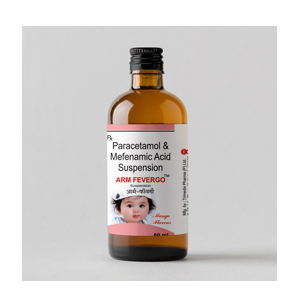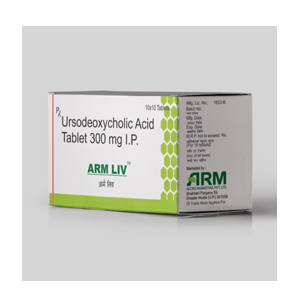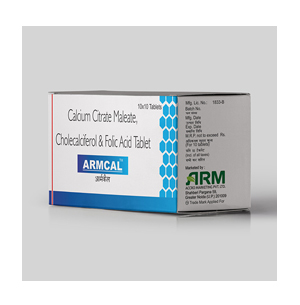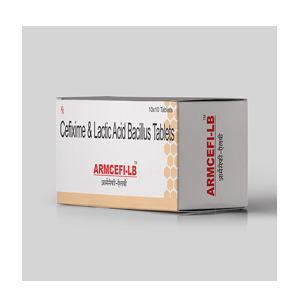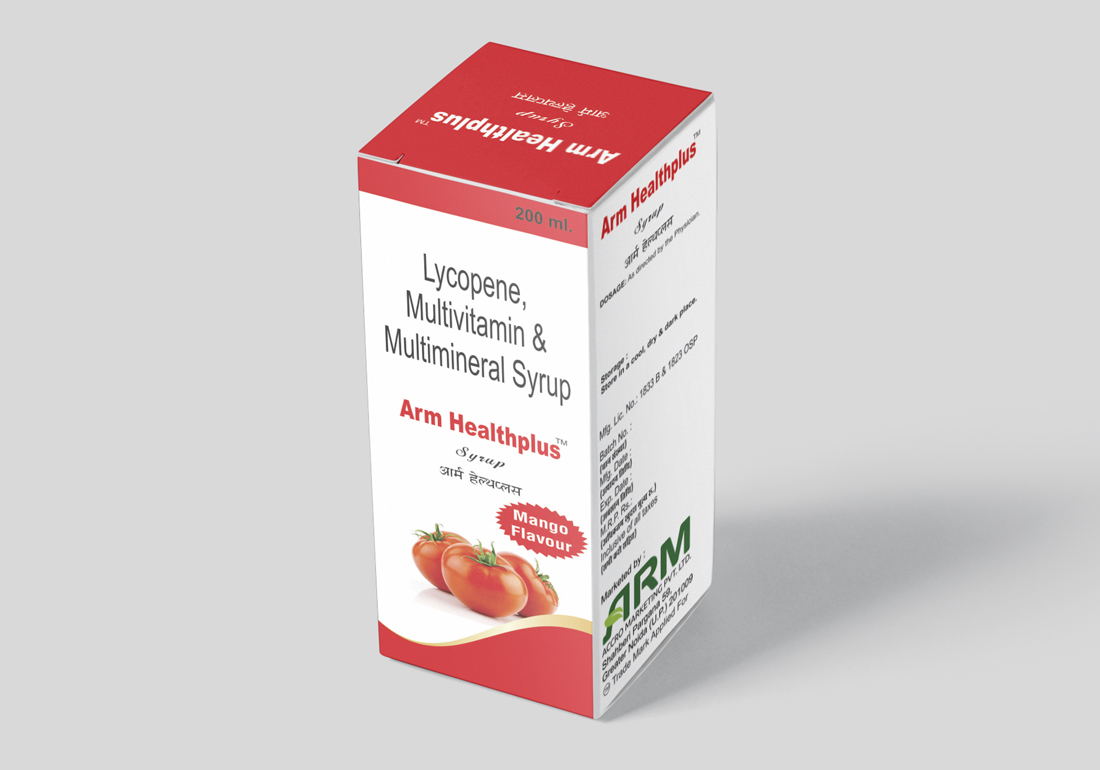
ARM HELLTHPLUS
OVERVIEW
ARM HEALTHPLUS is a composition of Lycopene with Multiminerals and Multivitamins Syrup.
Lycopene is a naturally occurring chemical that gives fruits and vegetables a red color. It is one of a number of pigments called carotenoids. Lycopene is found in tomatoes, watermelons, red oranges, pink grapefruits, apricots, rosehips, and guavas. In North America, 85% of dietary lycopene comes from tomato products such as ketchup, tomato juice, sauce, or paste. A serving of fresh tomatoes contains between 4 mg and 10 mg of lycopene, while one cup (240 mL) of tomato juice provides about 20 mg. Processing raw tomatoes using heat (in the making of tomato juice, tomato paste or ketchup, for example) actually changes the lycopene in the raw product into a form that is easier for the body to use. The lycopene in supplements is about as easy for the body to use as lycopene found in food.
People are trying lycopene for lowering blood pressure and high cholesterol, for heart disease and cancer, and many other conditions. However, there is no scientific evidence to support many of these uses.
Lycopene is a powerful antioxidant that may help protect cells from damage. This is why there is a lot of research interest in lycopene's role.
USES AND EFFECTIVNESS
Possibly Ineffective for
Bladder cancer. Research suggests that there is no link between lycopene consumption in the diet or lycopene blood levels and the risk for bladder cancer.
Diabetes. Research suggests that increased lycopene consumption in the diet does not decrease the risk of developing diabetes.
Parkinson's disease. Research suggests that increased lycopene consumption in the diet does not decrease the risk of developing Parkinson's disease.
Insufficient Evidence for
Age-related eye disease (age-related macular degeneration, AMD). Research on the effect of lycopene in AMD is inconsistent. Some evidence suggests that people with low lycopene levels are almost twice as likely to develop AMD compared to people with high levels. However, other research suggests that there is no link between lycopene levels or lycopene intake and the risk of AMD.
Amyotrophic lateral sclerosis (ALS, Lou Gehrig's disease). Lycopene is one type of carotenoid. Early research has found that diets rich in carotenoids such as lycopene are linked with a decreased risk of ALS. But diets specifically rich in lycopene alone don't seem to be linked with a decreased risk of ALS.
Asthma. Early research shows that taking a product containing lycopene doesn't prevent asthma flare-ups in people with stable asthma. But it might improve lung function after exercise in people with asthma who tend to have flare-ups after exercise.
Hardening of the arteries (atherosclerosis). There is some evidence that higher lycopene blood levels are associated with a reduced risk of hardening of the arteries. There is also early evidence that higher lycopene blood levels can reduce the risk of heart disease associated with hardening of the arteries. However, there does not appear to be a link between lycopene levels and stroke risk.
Enlarged prostate (benign prostatic hyperplasia). Early research shows that taking lycopene can slow the rate of prostate growth and can improve symptoms in people with this condition. However, other research found no link between lycopene intake in the diet and the development of an enlarged prostate.
Breast cancer. Research about how lycopene affects breast cancer risk is inconsistent. Some evidence suggests that having higher lycopene blood levels is associated with a lower risk of breast cancer. However, other research shows that neither lycopene intake nor lycopene blood levels are linked to breast cancer risk.
Heart disease. Some research shows that women with higher levels of lycopene in their blood have a reduced risk of developing heart disease or having a heart attack. But other research shows that diets rich in lycopene are not link with a reduced risk of heart attack or stroke in women or men who are at low risk for heart disease. Research also shows that taking a lycopene supplement does not reduce most risk factors for heart diseases, such as high blood pressure or high cholesterol. It's not known if taking a lycopene supplement reduces the risk of heart disease-related events such as stroke or heart attack.
Cataracts. One study suggests that higher lycopene blood levels are associated with a lower risk of developing cataracts. However, other studies have found no link between lycopene intake or lycopene blood levels and the risk of developing cataracts.
Cervical cancer. Research about how lycopene affects the risk of cervical cancer is inconsistent. Some evidence suggests that higher lycopene blood levels or higher lycopene intake in the diet is linked to a lower risk of cervical cancer. Other studies have not found this link.
Colon and rectal cancer. Some research has found that diets rich in lycopene are linked with a decreased risk of colon and rectal cancer. But other research has found no link between lycopene intake in the diet and the risk of colon and rectal cancer.
Cancer affecting the tube connecting the throat and stomach (esophageal cancer). Early research has found that diets rich in lycopene are linked with a decreased risk of esophageal cancer.
Muscle damage caused by exercise. Early research shows that taking a combination of lycopene and other ingredients can reduce the muscle damage that occurs with a 2-hour long-distance run.
Brain tumor (glioma). Early research shows that taking lycopene by mouth for 3 months does not improve the response to radiotherapy and chemotherapy in people with brain tumors.
Ulcers caused by H. pylori infection. Early research shows that taking lycopene along with antibiotics does not help treat H. pylori infection compared to taking antibiotics alone.
Human papilloma virus (HPV) infection. Women with higher levels of lycopene in their blood seem to recover from cancer-associated HPV infection faster than women with lower lycopene blood levels.
High cholesterol. Early research shows that taking a specific lycopene supplement (LycoRed, Jagsonpal Pharmaceuticals, India) by mouth daily for 6 months lowers total cholesterol and low-density lipoprotein (LDL or "bad") cholesterol, and increases high-density lipoprotein (HDL or "good") cholesterol. However, other evidence suggests that lycopene does not affect cholesterol levels in healthy adults or in those with heart disease.
High blood pressure. Early research shows that taking lycopene daily for 8 weeks seems to lower blood pressure in people with high blood pressure. However, taking this same product did not lower blood pressure in people with pre-hypertension.
Lung cancer. Research about how lycopene affects the risk of lung cancer is inconsistent. Some research shows that lower lycopene intake in the diet is linked to an increased risk of lung cancer. However, other research suggests that there is no link between lycopene consumption in the diet or lycopene blood levels and lung cancer risk.
Male fertility problems. Early research shows that taking lycopene by mouth daily for 3 months improves sperm quality in some men with fertility problems due to unknown causes.
Menopausal symptoms. Early research shows that taking a specific product containing lycopene, calcium, vitamin D3, astaxanthin, and citrus bioflavonoids daily for 8 weeks reduces menopausal symptoms including hot flashes, joint pain, anxiety, and depression.
White pre-cancerous patches in the mouth (oral leukoplakia). Early research shows that taking a specific lycopene supplement by mouth twice daily improves white pre-cancerous patches in the mouth.
A mouth condition called oral submucous fibrosis. Some people with this condition can't open their mouth as wide as normal. Taking lycopene for 2-3 months might help these people open their mouth by a small amount more.
Ovarian cancer. There is inconsistent evidence about the effect of lycopene on ovarian cancer risk. Some research shows that a diet rich in carotenoids, including lycopene, seems to help prevent ovarian cancer in young (premenopausal) women. However, other research shows that the risk of developing ovarian cancer is not linked to lycopene blood levels or lycopene intake from the diet.
Pancreatic cancer. Some early research shows that a diet high in lycopene, primarily from tomatoes, seems to lower the risk of developing pancreatic cancer.
Gum disease. Research about the effects of lycopene on gingivitis is inconsistent. Some research shows that taking a specific lycopene supplement by mouth for 2 weeks or receiving a single shot of lycopene gel into the gums reduces gum disease. But other research shows that taking a product containing lycopene and other vitamins and minerals does not reduce gum disease.
Polymorphous light eruption (PMLE). Early research shows that a combination product containing lycopene and other ingredients can reduce skin reactions to light in people with PMLE.
High blood pressure during pregnancy. Research on the effect of lycopene for preventing high blood pressure during pregnancy is unclear.
Some research shows that taking a specific lycopene supplement twice daily starting between weeks 16 and 20 of pregnancy and continuing until delivery lowers blood pressure and reduces associated complications. However, other research suggests that lycopene does not affect blood pressure during pregnancy.
Prostate cancer. Research on the effects of lycopene for preventing or treating prostate cancer is inconsistent. Some research suggests that increasing lycopene consumption in the diet, or having higher lycopene blood levels, is linked with a lower risk of prostate cancer. However, other research shows no link between lycopene intake or blood levels and prostate cancer risk.
In addition, early research in men with precancerous changes in their prostate shows that taking lycopene supplements might delay or prevent the progression to prostate cancer. However, in other research, taking lycopene daily for up to one year did not seem to help treat prostate cancer.
Prostate swelling and pelvic pain. Early research shows that taking a specific combination of lycopene, selenium, and saw palmetto by mouth for 8 weeks reduces pain in men with prostate swelling and pelvic pain compared to taking saw palmetto alone.
Kidney cancer (renal cell carcinoma). Early research shows no link between lycopene consumption in the diet and the risk of developing kidney cancer
Sunburn. Early research shows that taking lycopene by mouth, alone or together with other ingredients, might protect against sunburn.
Other Products
Contact Us
Have any question? We'd love to hear from you



